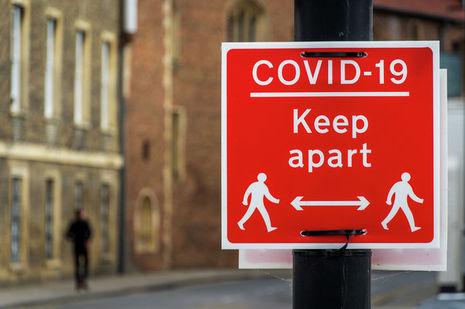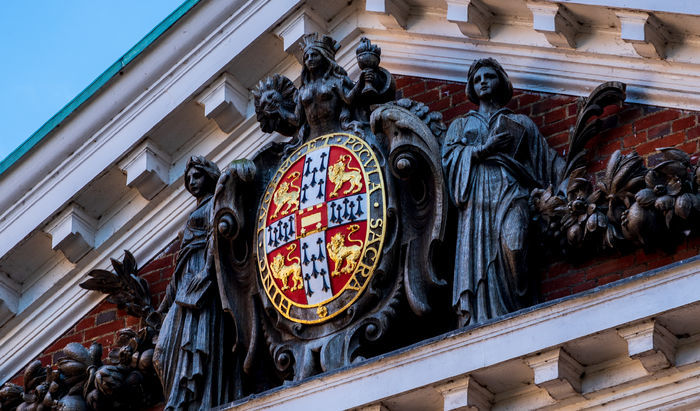Covid: Three years on
As life returns to normal, Taneesha Datta finds out what’s changed

“The virus has so far claimed 26 lives in China,” reads a Varsity article from January 2020. Jesus College had hosted 15 visiting students from Wuhan the week before. The outbreak itself was considered such inconsequential news that the next print edition made no mention of it at all.
Then, in March, the Boat Race was called off for the first time since the Second World War. May Balls were ordered to issue refunds, Scudamore’s was forced to lay down its poles, and students were sent home. As Varsity reporters scrambled to publish daily updates, the city fell into silence.
Six months later, amid online lectures and weekly swab days, students found ways to construct a life beyond college walls: long walks to Grantchester, misty evenings on Coe Fen. Cindies opened its doors as a socially-distanced, sit-down club – last entry 6:45, masks mandatory, six VKs for £15.
“The number of student intermittences rose by 93% from 2019-20 to 2020-21”
The last cohort to have experienced a full term of pre-pandemic Cambridge graduated in 2022. The rest of us were left wondering how to separate the normal from the abnormal. As Cambridge gradually sinks back into in-person contact, choice remnants of life under lockdown remain: online exams, lecture recordings, occasional Zoom meetings. But two years of remote learning and social distancing have taken a heavy toll. The number of student intermittences rose by 93% from 2019-20 to 2020-21, and then reached an unprecedented high of 503 in 2021-22.
Jen, who has been at Cambridge since 2018, recalls the frequent social events of her first year at university – small catchups, shared bakery spreads, summer parties. Things are different now, she thinks. The quiet dwindling of shared social spaces over the pandemic has meant that, in its aftermath, the Cambridge social calendar has shrunk. “It’s wiped out people’s ability to make friends,” she says.
With two years lost to Covid-19, smaller societies or venues that once served as social hubs for certain groups – those studying a certain subject, for example – no longer operate in the way that they used to. “People who knew how to run these societies have graduated,” says Ana, who has been at Cambridge since 2017. Students who joined university in the midst of the pandemic were left to pick up the pieces, with little guidance or continuity. Each cohort’s time at Cambridge is limited to three short years, which means that institutional memory was remarkably fragile.
Colleges, too, were forced to upend centuries of tradition, restructuring campus life in the face of crisis. There were new outdoor seating areas, takeaway-only catering facilities, and strict bans on inter-household socialising and non-college guests. In Michaelmas 2020 alone, Gonville and Caius fined its students £4,850 for breaching Covid-19 rules. With increasingly militant attitudes from colleges as the months progressed, King’s went so far as to ban swimming and barbecues at Grantchester in July 2021.
“King’s went so far as to ban swimming and barbecues at Grantchester”
But even today, colleges seem to be offering more limited social opportunities than they once did. Previously popular social venues like the Caius Underbar are now gathering dust. Last term, student-run events were temporarily banned at St. John’s after a ceiling tile was left smashed at a bop. And where daily formals were taken for granted prior to the pandemic, Pembroke now holds only three formals each week.
Alex, who began at Cambridge in 2018, notes the marked difference in how students interact with college porters. During the pandemic, porters were responsible for enforcing the rules, made to hand out fines and chase freshers out of each other’s rooms. “Before, they used to be seen as friendly and helpful members of college you’d chat to in the smoking area or pop into plodge for a chat,” he says. “I think that relationship never really got repaired.”
In recent terms, porters have been criticised for their links to the varied rules for access to college grounds, which remain stricter than they once were. “It used to be easier to wander into colleges, just to nip through. It doesn’t feel as comfortable anymore,” said Ana. “It’s like you always need a reason now.” Alex, too, points out that some inter-college socialising traditions have been lost in the aftermath of the pandemic, recalling the “long boozy nights spent traipsing through different college accommodations or marching between far-flung plodges” before 2020.
As an undergraduate, Ana also participated in two Cambridge-linked schemes to teach English abroad at summer schools. Neither of the two schemes are offered any longer. Pre-pandemic fixtures – chips & beer in Sidney hall, full-capacity formals, in-person admissions interviews – are foreign to most current students. Three years on, we’re still struggling to resurrect past traditions.
The sense that the pandemic robbed some of us of the traditional university experience – or that, conversely, it’s within our power to redefine the next normal – reflects the peculiar transition we’ve witnessed over the past three years. Rent strikes, pension strikes, protests, vaccinations, a cost-of-living crisis, screening programmes, divestment pledges, a marking boycott; particularly for current finalists, the past three years have not been easy.
Yet Cambridge has begun inching towards recovery. After months of student negotiations, the Newnham Party Room, which has been used as a storage space since 2020, will be available for use once more from Michaelmas 2023. At the end of last term, Pembroke agreed to increase its number of weekly formals from two to three. Small victories, perhaps, but hard-won.
 News / Cambridge study finds students learn better with notes than AI13 December 2025
News / Cambridge study finds students learn better with notes than AI13 December 2025 News / Cambridge Vet School gets lifeline year to stay accredited28 November 2025
News / Cambridge Vet School gets lifeline year to stay accredited28 November 2025 Science / Did your ex trip on King’s Parade? The science behind the ‘ick’12 December 2025
Science / Did your ex trip on King’s Parade? The science behind the ‘ick’12 December 2025 News / Uni Scout and Guide Club affirms trans inclusion 12 December 2025
News / Uni Scout and Guide Club affirms trans inclusion 12 December 2025 Arts / Modern Modernist Centenary: T. S. Eliot13 December 2025
Arts / Modern Modernist Centenary: T. S. Eliot13 December 2025








